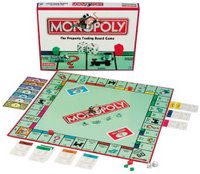 So what is it with monopolies, eh? Clearly not content with my own wee Cue Card on the subject, I saw someone yesterday (somewhere) asking what the heck problem we free-marketeers have with regulating and stealing from Telecom -- after all, said the questioner, it's only regulating and stealing from a monopoly so as to increase competition, right? So that must be a good thing, right, for markets and consumers? The more 'pure and perfect competition the better,' right?
So what is it with monopolies, eh? Clearly not content with my own wee Cue Card on the subject, I saw someone yesterday (somewhere) asking what the heck problem we free-marketeers have with regulating and stealing from Telecom -- after all, said the questioner, it's only regulating and stealing from a monopoly so as to increase competition, right? So that must be a good thing, right, for markets and consumers? The more 'pure and perfect competition the better,' right?Sigh. Not right. Not right at all. Clearly I haven't said enough about 'competition,' and since my own chat on monopolies was insufficiently persuasive, then let me offer you something much longer, much more learned, and much, much better written than my own poor contribution: George Reisman's recently republished classic on monopolies, the theoretical foundations of 'anti-competitive' legislation, and the nonsense of "pure and perfect competition." Here's just a taste:
'Pure and perfect competition' is totally unlike anything one normally means by the term “competition” ... While competition as normally, and properly, understood rests on a base of individualism, the base of 'pure and perfect competition' is collectivism...Or maybe forced, just sometimes -- just when enough people can be found who expect to benefit from the resultant looting. Read on here to find out why the 'ideal' of competition militates against real competition, and why Plato really is to blame. (And if like it so much you want to buy a few pamphlets and pass them around, then here's a link to George's shop.)
According to contemporary economics, no property is to be regarded as really private. At most, property is supposedly held in trusteeship for its alleged true owner, 'society' or the “consumers.' 'Society,' it is alleged, has a right to the property of every producer and suffers him to continue as owner only so long as 'society' receives what it or its professorial spokesmen consider to be the maximum possible benefit...
According to the tribal concept of property, 'society' has a right to one hundred percent of every seller’s inventory and to the benefit of one hundred percent use of his plant and equipment. The exercise of this alleged right is to be limited only by the consideration of 'society’s' alleged alternative needs...
The ideal of contemporary economics—advanced half as an imaginary construct and half as a description of reality, with no way of distinguishing between the two—is the contradictory notion of a private-enterprise, capitalist economy in which producers would act just as a socialist dictator would wish them to act, but without having to be forced to do so...
LINKS: Cue Card Libertarianism - Not PC (Peter Cresswell)
Platonic Competition (Part 1) - George Reisman's blog
Platonic Competition (Part 2) - George Reisman's blog
Pamphlets by George Reisman - Jefferson School of Philosophy, Economics and Psychology
TAGS: Economics, Politics, Nonsense, Telecom
1 comment:
While I tend to agree there are some monopolies that due to economy of scale and that they were able to provide a good or service at a better price\quality they dominate the market.
For example, if Air New Zealand provided a really good service and cheap prices it could in theory get a monopoly or near monoploy on the trans-tasman route.
In a competitive environment this is fine.
However, if Air New Zealand also owned the airports and eliminated or stifled the competition by refusing acess to use the airport and claim that any new airline that wanted to enter the trans-tasman route must first build their own airport.
This is a barrier to entry into a market which monopolies tend to use to stop or limit competition.
Post a Comment